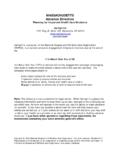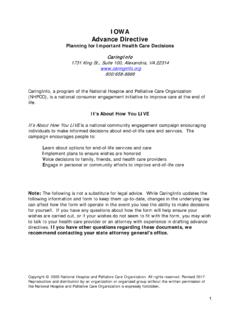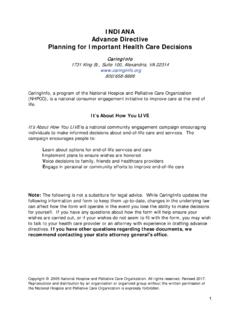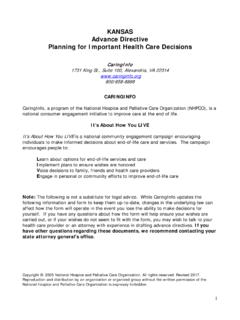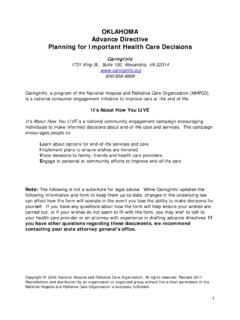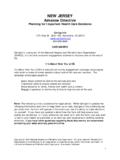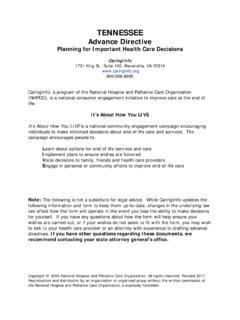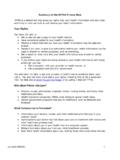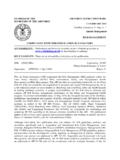Transcription of MISSOURI - Caring Inc
1 1 MISSOURI Advance Directive Planning for Important Health Care Decisions CaringInfo 1731 King St., Suite 100, Alexandria, VA 22314 800/658-8898 CaringInfo, a program of the National Hospice and Palliative Care Organization (NHPCO), is a national consumer engagement initiative to improve care at the end of life. It s About How You LIVE It s About How You LIVE is a national community engagement campaign encouraging individuals to make informed decisions about end-of-life care and services. The campaign encourages people to: Learn about options for end-of-life services and care Implement plans to ensure wishes are honored Voice decisions to family, friends and health care providers Engage in personal or community efforts to improve end-of-life care Note: The following is not a substitute for legal advice. While CaringInfo updates the following information and form to keep them up-to-date, changes in the underlying law can affect how the form will operate in the event you lose the ability to make decisions for yourself.
2 If you have any questions about how the form will help ensure your wishes are carried out, or if your wishes do not seem to fit with the form, you may wish to talk to your health care provider or an attorney with experience in drafting advance directives. If you have other questions regarding these documents, we recommend contacting your state attorney general's office. Copyright 2005 National Hospice and Palliative Care Organization. All rights reserved. Revised 2017. Reproduction and distribution by an organization or organized group without the written permission of the National Hospice and Palliative Care Organization is expressly forbidden. 2 Using these Materials BEFORE YOU BEGIN 1. Check to be sure that you have the materials for each state in which you may receive health care. 2. These materials include: Instructions for preparing your advance directive, please read all the instructions. Your state-specific advance directive forms, which are the pages with the gray instruction bar on the left side.
3 ACTION STEPS 1. You may want to photocopy or print a second set of these forms before you start so you will have a clean copy if you need to start over. 2. When you begin to fill out the forms, refer to the gray instruction bars they will guide you through the process. 3. Talk with your family, friends, and physicians about your advance directive. Be sure the person you appoint to make decisions on your behalf understands your wishes. 4. Once the form is completed and signed, photocopy the form and give it to the person you have appointed to make decisions on your behalf, your family, friends, health care providers and/or faith leaders so that the form is available in the event of an emergency. 5. You may also want to save a copy of your form in an online personal health records application, program, or service that allows you to share your medical documents with your physicians, family, and others who you want to take an active role in your advance care planning.
4 3 INTRODUCTION TO YOUR MISSOURI ADVANCE DIRECTIVE This packet contains a legal document, a MISSOURI Advance Directive, that protects your right to refuse medical treatment you do not want, or to request treatment you do want, in the event you lose the ability to make decisions yourself. You may fill out Part I, Part II, or both depending on your advance-planning needs. You must fill out Part IV. Part I, Durable Power of Attorney for Health Care Choices, lets you name someone (an agent, sometimes called an attorney in fact) to make decisions about your health care. Depending on how you fill out your form, this part becomes effective either immediately or when your doctor and one other doctor certify that you are unable by reason of any physical or mental condition to receive and evaluate health care treatment information or to communicate health care decisions. You may choose to have one physician, instead of two, determine whether you are incapacitated (unable to make health care decisions) by initialing the statement in Part I.
5 Part II is a Health Care Choices Directive. This is similar to a living will, although this form which is based on the form created by the MISSOURI Attorney General allows you to make a broader range of decisions than allowed by MISSOURI s statutory living will. Part II lets you state your wishes about health care in the event that you can no longer speak for yourself. Specifically, Part II allows you to choose specific treatments that you wish to be withheld or withdrawn in the event you have a terminal illness or are persistently unconscious. Part II also allows you to make choices regarding organ donation and includes space for you to add additional instructions and describe your feelings regarding what constitutes an acceptable quality of life. Your Health Care Choices Directive becomes effective when you can no longer make or communicate your health care decisions. Part III describes the relationship between Part I and Part II. Part IV contains the signature and witnessing provisions so that your document will be effective.
6 This form does not expressly address mental illness. If you would like to make advance care plans regarding mental illness, you should talk to your physician and an attorney about a durable power of attorney tailored to your needs. Note: These documents will be legally binding only if the person completing them is a competent adult (at least 18 years old). 4 COMPLETING YOUR MISSOURI ADVANCE DIRECTIVE How do I make my MISSOURI Advance Directive Legal? In order for Part I to be effective, you must have your signature notarized. In order for Part II to be effective, you must sign and date your MISSOURI Advance Directive in the presence of two witnesses who are 18 years or older, neither of whom can be a person signing on your behalf if you are physically unable to sign for yourself. If you fill out both Part I and Part II, you will need to have your signature both witnessed and notarized. Who should I pick as my Agent? Your agent is the person you appoint to make decisions about your health care if you become unable to make those decisions yourself.
7 Your agent may be a family member or a close friend whom you trust to make serious decisions. The person you name as your agent should clearly understand your wishes and be willing to accept the responsibility of making health care decisions for you. Your agent may not be your physician or an employee of your physician, or an owner, operator, or employee of the health care facility in which you reside, unless the person is your spouse, parent, child, grandparent, sibling, or grandchild. You can appoint a second person as your alternate agent. The alternate will step in if the first person you name as an agent is unable, unwilling, or unavailable to act for you. Should I add other instructions to my MISSOURI Advance Directive? One of the strongest reasons for naming an agent is to have someone who can respond flexibly as your health care situation changes and deal with situations that you did not foresee. If you add instructions to this document it may help your agent carry out your wishes, but be careful that you do not unintentionally restrict your agent s power to act in your best interest.
8 In any event, be sure to talk with your agent about your future medical care and describe what you consider to be an acceptable quality of life. What if I change my mind? You may revoke your MISSOURI Advance Directive at any time and in any manner that reflects your intent to revoke. Examples of revocation include tearing your document, orally stating your intent to revoke, or executing a written revocation. Part II is revoked automatically when you revoke, but revocation of your agent s powers (Part I) becomes effective only once you notify your agent or your physician or treating 5 health care provider. In any event, it is a good idea to tell your agent and your physician or other treating health care provider about your decision to revoke. Executing a new advance directive that appoints an agent will automatically revoke your agent's authority. Unless your MISSOURI Advance Directive expressly provides otherwise, if you have appointed your spouse as your agent, filing of any action for divorce or dissolution of your marriage automatically terminates your spouse s authority as your agent.
9 What other important facts should I know? Your agent can refuse or withdraw artificial nutrition and hydration on your behalf only if you specifically grant such authority. In order to grant this authority, you must initial the line next to this treatment in Part II. Before your agent may authorize withdrawal of artificial nutrition or hydration, your physician must: Attempt to explain the intent to withdraw artificial nutrition or hydration and the consequences of withdrawal to you and give you an opportunity to refuse withdrawal; or Certify that you are comatose or consistently in a condition which makes it impossible for you to understand the intent to withdraw artificial nutrition and hydration and the consequences of withdrawal. Any directions you give to withhold or withdraw treatments will not be given effect in the event you are pregnant. 6 MISSOURI ADVANCE DIRECTIVE PAGE 1 OF 6 Part I. Durable Power of Attorney for Health Care Choices I, _____, appoint Name: _____ Address: _____ as my agent for health care choices when I am unable to make decisions or communicate my wishes.
10 In the case the person above cannot serve as my agent, or if I am divorced from or legally separated from the agent above, I appoint the person below: Name: _____ Address: _____ This alternate agent may make health care decisions for me when I am unable to do so or to communicate my wishes. This durable power of attorney becomes effective when two physicians certify that I am incapacitated and unable to make and communicate health care choices. You may choose to have one physician, instead of two, determine whether you are incapacitated. If you want to exercise this option allowing one physician to determine whether you are incapacitated initial here. _____ PRINT YOUR NAME PRINT YOUR AGENT'S NAME AND ADDRESS PRINT YOUR ALTERNATE AGENT'S NAME AND ADDRESS INITIAL HERE IF YOU WANT TO ALLOW ONLY ONE PHYSICIAN TO DETERMINE WHETHER YOU ARE INCAPACITATED 2005 National Hospice and Palliative Care Organization 2017 Revised.
